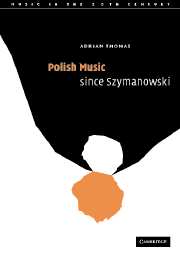Book contents
- Frontmatter
- Contents
- List of musical examples
- Preface
- Acknowledgements
- List of abbreviations
- Part I The captive muse
- 1 Szymanowski and his legacy
- 2 The Second World War
- 3 Post-war reconstruction
- 4 Socialist realism I: its onset and genres
- 5 Socialist realism II: concert music
- Part II Facing west
- Part III The search for individual identity
- Part IV Modernisms and national iconographies
- Part V Postscript
- Appendix 1 Cultural events in Poland, 1953–6
- Appendix 2 ‘Warsaw Autumn’ repertoire, 10–21 October 1956
- Appendix 3 ‘Warsaw Autumn’ repertoire, 1958–61
- Appendix 4 Selected Polish chronology (1966–90)
- Notes
- Select bibliography
- Index
1 - Szymanowski and his legacy
Published online by Cambridge University Press: 22 September 2009
- Frontmatter
- Contents
- List of musical examples
- Preface
- Acknowledgements
- List of abbreviations
- Part I The captive muse
- 1 Szymanowski and his legacy
- 2 The Second World War
- 3 Post-war reconstruction
- 4 Socialist realism I: its onset and genres
- 5 Socialist realism II: concert music
- Part II Facing west
- Part III The search for individual identity
- Part IV Modernisms and national iconographies
- Part V Postscript
- Appendix 1 Cultural events in Poland, 1953–6
- Appendix 2 ‘Warsaw Autumn’ repertoire, 10–21 October 1956
- Appendix 3 ‘Warsaw Autumn’ repertoire, 1958–61
- Appendix 4 Selected Polish chronology (1966–90)
- Notes
- Select bibliography
- Index
Summary
In May 1935, Karol Szymanowski reached the Latvian capital, Riga, as part of what turned out to be his last major concert tour. Although the performance of his Symphonie concertante for piano and orchestra (1932) failed to materialise, he did accompany his sister, the soprano Stanisława Szymanowska, and the violinist Wacław Niemczyk in two recitals of his songs and chamber music. Coincidentally, the twenty-two-year-old Witold Lutosławski was also in Riga to perform his Piano Sonata (1934) as part of a student exchange concert. Tantalisingly, this was to be the one and only meeting between two of the major figures in twentieth-century Polish music. Lutosławski later recalled: ‘Szymanowski was extremely kind to our small group. He came to our concert, we walked around the town together and accompanied him to Radio Riga … After our concert, Wacław Niemczyk told me: “Karol liked your Sonata very much; however he wouldn't say it to you.”’
Two years later, on Easter Sunday, 29 March 1937, Szymanowski died aged fifty-four in a Swiss sanatorium, the victim of long-term tuberculosis. For some time, Szymanowski had felt neglected in Poland. As he wrote from his rented home, ‘Atma’, in the Tatra mountain resort of Zakopane in 1934:
Polish officialdom (the Government) repeatedly refuses to recognise me. They do so only when I am needed for propaganda purposes, as it is impossible even for them to deny that amongst creative artists (not virtuosi) I alone (and not solely amongst composers but in other fields as well) have already acquired some reputation abroad … The fact is, they care nothing for me here, and that I could die without anyone lifting a finger.
My funeral will be a different story. I am convinced it will be splendid. People here love the funeral processions of great men.
- Type
- Chapter
- Information
- Polish Music since Szymanowski , pp. 3 - 15Publisher: Cambridge University PressPrint publication year: 2005



